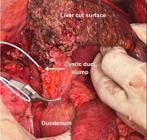ABSTRACT
BACKGROUND: Biliary fistula is one of the most common complications after liver resection and is associated with significant morbidity and mortality. One of the methods used to evaluate biliary fistulas is the White test, which consists of injecting a lipid emulsion into the bile duct. However, no standard technique for performing the White test has been published.
AIMS: The aim of this study was to standardize the technique for performing the White test in patients undergoing hepatectomies, with and without previous cholecystectomy, and to assess the preliminary results.
METHODS: Patients over 18 years of age who were submitted to open hepatectomy were included in the study. The primary outcome was the rate of biliary fistula. Secondary outcomes were the incidence of acute pancreatitis and overall morbidity, measured by the Clavien-Dindo classification.
RESULTS: The standard technique for the White test was performed on 17 patients. In total, three patients had previous cholecystectomy, and two had low insertion of the cystic duct, requiring cannulation of the hepatocholedochal duct. None of the patients developed clinically significant biliary leaks. Acute pancreatitis did not occur in any patient. One patient developed pneumonia requiring mechanical ventilation (Clavien-Dindo IV). All others had minor or no complications.
CONCLUSIONS: The standardized technique for performing the White test suggests an appropriate strategy to maximize the detection of intraoperative biliary leaks.
HEADINGS:
Biliary Fistula; Hepatectomy; Pancreatitis

 STANDARDIZATION OF THE WHITE TEST IN OPEN LIVER RESECTION: TOWARD NEAR-ZERO CLINICALLY SIGNIFICANT BILE LEAKAGE
STANDARDIZATION OF THE WHITE TEST IN OPEN LIVER RESECTION: TOWARD NEAR-ZERO CLINICALLY SIGNIFICANT BILE LEAKAGE Thumbnail
Thumbnail
 Thumbnail
Thumbnail
 Thumbnail
Thumbnail
 Thumbnail
Thumbnail



